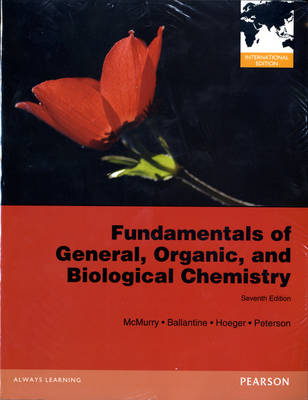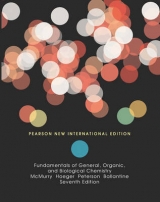
Fundamentals of Chemistry, plus MasteringChemistry with Pearson eText
Pearson Education Limited
978-1-4479-2447-0 (ISBN)
- Titel erscheint in neuer Auflage
- Artikel merken
Fundamentals of General, Organic, and Biological Chemistry by McMurry, Ballantine, Hoeger, and Peterson provides background in chemistry and biochemistry with a relatable context to ensure students of all disciplines gain an appreciation of chemistry's significance in everyday life.
Known for its clarity and concise presentation, this book balances chemical concepts with examples, drawn from students' everyday lives and experiences, to explain the quantitative aspects of chemistry and provide deeper insight into theoretical principles. The Seventh Edition focuses on making connections between General, Organic, and Biological Chemistry through a number of new and updated features - including all-new Mastering Reactions boxes, Chemistry in Action boxes, new and revised chapter problems that strengthen the ties between major concepts in each chapter, practical applications, and much more.
MyLab and Mastering from Pearson improve results for students and educators. Used by over ten million students, they effectively engage learners at every stage.
With proven success, Mastering has helped students make strides in learning for over 10 years. MasteringChemistry has immersive content and tools that are so engaging that Ann Verner, at the University of Toronto Scarborough, Canada, said, "MasteringChemistry is the best online chemistry homework program that I have used. The structure of the questions and the hints motivate the students to continue working on the problems, and the immediate feedback increases their confidence."
With MasteringChemistry, students gain knowledge that they will use throughout their lives, and universities gain a partner deeply committed to helping students and educators achieve their goals.
For students
Pearson eText gives you access to an eBook that can be used on the go, and allows you to highlight, search and take notes as you read online. Access to the eBook depends on the package you have bought.
You can work through the problems at your own pace, opening hints if you need help. If you make an error, you are given feedback based on that specific mistake so you can learn from it.
PhET simulations let you to get hands on to understand how the theory and daily life link up. These fun, interactive, research-based simulations of physical phenomena come from the PhET (TM) project at the University of Colorado.
For educators
Online assignments, tests, quizzes can be easily created and assigned to students.
Gradebook: Assignments are automatically graded and visible at a glance.
Register now to benefit from these resources.
A student access code card is included with your textbook at a reduced cost. To register with your code, visit www.masteringchemistry.com.
For educator access, contact your Pearson account manager. To find out who your account manager is, visit www.pearsoned.co.uk/replocator
For more instructor resources available with this title, visit www.pearsoned.co.uk
John McMurry, educated at Harvard and Columbia, has taught approximately 17,000 students in general and organic chemistry over a 30-year period. A Professor of Chemistry at Cornell University since 1980, Dr. McMurry previously spent 13 years on the faculty at the University of California at Santa Cruz. He has received numerous awards, including the Alfred P. Sloan Fellowship (1969 71), the National Institute of Health Career Development Award (1975 80), the Alexander von Humboldt Senior Scientist Award (1986 87), and the Max Planck Research Award (1991). David S. Ballantine received his B.S. in Chemistry in 1977 from the College of William and Mary in Williamsburg, VA, and his Ph.D. in Chemistry in 1983 from the University of Maryland at College Park. After several years as a researcher at the Naval Research Labs in Washington, DC, he joined the faculty in the Department of Chemistry and Biochemistry of Northern Illinois University, where he has been a professor since 1989. He was awarded the Excellence in Undergraduate Teaching Award in 1998 and has been departmental Director of Undergraduate Studies since 2008. In addition, he is the coordinator for the Introductory and General Chemistry programs, and is responsible for supervision of the laboratory teaching assistants. Carl A. Hoeger received his B.S. in Chemistry from San Diego State University and his Ph.D. in Organic Chemistry from the University of Wisconsin, Madison in 1983. After a postdoctoral stint at the University of California, Riverside, he joined the Peptide Biology Laboratory at the Salk Institute in 1985 where he ran the NIH Peptide Facility while doing basic research in the development of peptide agonists and antagonists. During this time he also taught general, organic, and biochemistry at San Diego City College, Palomar College, and Miramar College. He joined the teaching faculty at University of California, San Diego in 1998. Dr. Hoeger has been teaching chemistry to undergraduates for over 20 years, where he continues to explore the use of technology in the classroom; his current project involves the use of video podcasts as adjuncts to live lectures. In 2004 he won the Paul and Barbara Saltman Distinguished Teaching Award from UCSD. He is deeply involved with the General Chemistry program at UCSD, and also shares partial responsibility for the training and guidance of teaching assistants in the Chemistry and Biochemistry departments. Virginia E. Peterson received her B.S. in Chemistry in 1967 from the University of Washington in Seattle, and her Ph.D. in Biochemistry in 1980 from the University of Maryland at College Park. Between her undergraduate and graduate years she worked in lipid, diabetes, and heart disease research at Stanford University. Following her Ph.D. she took a position in the Biochemistry Department at the University of Missouri in Columbia and is now Professor Emerita. When she retired in2011 she had been the Director of Undergraduate Advising for the department for 8 years and had taught both senior capstone classes and biochemistry classes for nonscience majors. Although retired Dr. Peterson continues to advise undergraduates and teach classes. Awards include both the college level and the university-wide Excellence in Teaching Award and, in 2006, the University's Outstanding Advisor Award and the State of Missouri Outstanding University Advisor Award. Dr. Peterson believes in public service and in 2003 received the Silver Beaver Award for service from the Boy Scouts of America.
1. Matter and Measurements
2. Atoms and the Periodic Table
3. Ionic Compounds
4. Molecular Compounds
5. Classification and Balancing of Chemical Reactions
6. Chemical Reactions: Mole and Mass Relationships
7. Chemical Reactions: Energy, Rates, and Equilibrium
8. Gases, Liquids, and Solids
9. Solutions
10. Acids and Bases
11. Nuclear Chemistry
12. Introduction to Organic Chemistry: Alkanes
13. Alkenes, Alkynes, and Aromatic Compounds
14. Some Compounds with Oxygen, Sulfur, or a Halogen
15. Amines
16. Aldehydes and Ketones
17. Carboxylic Acids and their Derivatives
18. Amino Acids and Proteins
19. Enzymes and Vitamins
20. The Generation of Biochemical Energy
21. Carbohydrates
22. Carbohydrate Metabolism
23. Lipids
24. Lipid Metabolism
25. Nucleic Acids and Protein Synthesis
26. Genomics
27. Protein and Amino Acid Metabolism
28. Chemical Messengers: Hormones, Neurotransmitters, and Drugs
29. Body Fluids
| Erscheint lt. Verlag | 12.4.2012 |
|---|---|
| Verlagsort | Harlow |
| Sprache | englisch |
| Maße | 216 x 278 mm |
| Gewicht | 2010 g |
| Themenwelt | Naturwissenschaften ► Chemie |
| ISBN-10 | 1-4479-2447-9 / 1447924479 |
| ISBN-13 | 978-1-4479-2447-0 / 9781447924470 |
| Zustand | Neuware |
| Haben Sie eine Frage zum Produkt? |
aus dem Bereich



